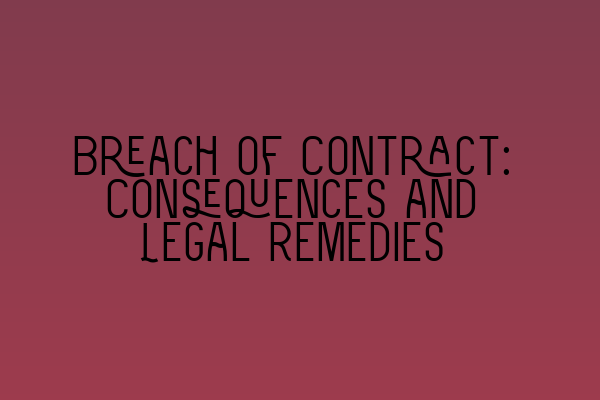When two parties enter into a contract, they have certain expectations of each other. They rely on the terms of the agreement to outline their rights and obligations. However, in some unfortunate instances, one party may fail to fulfill their contractual obligations, resulting in a breach of contract.
A breach of contract occurs when one party fails to perform their duties as specified in the contract. This failure can take various forms, such as non-payment, incomplete work, or failure to deliver goods on time. When a breach occurs, it is important for the non-breaching party to understand the consequences and available legal remedies.
Consequences of Breach of Contract
The consequences of a breach of contract can vary based on the specifics of the case and the terms outlined in the contract. However, there are some common consequences that may arise:
1. Compensatory Damages: The non-breaching party is entitled to compensatory damages, which aim to put the injured party in the position they would have been in if the breach had not occurred. These damages can include the cost of rectification, lost profits, and any other foreseeable losses directly resulting from the breach.
2. Specific Performance: In some cases, compensatory damages might not be sufficient to remedy the harm caused by the breach. The non-breaching party may seek a court order for specific performance, which requires the breaching party to fulfill their contractual obligations. This remedy is often sought when the subject matter of the contract is unique or if monetary damages are inadequate.
3. Limitation of Liability: Many contracts include clauses that limit the breaching party’s liability in case of a breach. These clauses may cap the amount of damages that can be awarded or exclude certain types of damages altogether. It is essential to effectively negotiate and include such clauses when drafting a contract to protect your interests.
4. Rescission and Restitution: Rescission refers to the cancellation of the contract when a breach occurs. The non-breaching party can seek to be released from the contractual obligations and return to their pre-contract position. Restitution involves returning any benefits received from the breaching party, restoring the parties to their original positions.
Legal Remedies for Breach of Contract
When faced with a breach of contract, the non-breaching party has several legal remedies they can pursue. These remedies aim to protect their rights, compensate for losses, and restore the injured party to their rightful position:
1. Lawsuit: The non-breaching party can file a lawsuit against the breaching party seeking compensatory damages, specific performance, or other appropriate remedies. It is advisable to consult with a solicitor who specializes in contract law to ensure proper legal representation throughout the process.
2. Mediation and Arbitration: Before initiating a lawsuit, parties can attempt alternative dispute resolution methods such as mediation or arbitration. These methods involve a neutral third party who facilitates negotiations and helps the parties reach a resolution outside of court. Mediation and arbitration can be quicker and less costly than litigation.
3. Amendment or Renegotiation: In some cases, the parties may choose to amend the contract or renegotiate its terms to resolve the breach. This approach can be suitable when there is a possibility of salvaging the contractual relationship or if the breach was due to unforeseen circumstances.
Conclusion
A breach of contract can have significant consequences for both parties involved. Understanding the consequences and available legal remedies is crucial for protecting your rights and recovering from the breach. Seeking professional legal advice from a solicitor who specializes in contract law can provide invaluable guidance and increase your chances of a favorable outcome.
Remember, prevention is always better than cure. By carefully drafting and negotiating a contract, including clauses that address potential breaches and their consequences, parties can minimize the likelihood of disputes arising. Properly executed contracts provide a solid foundation for a successful business relationship.
For further preparation for SQE exams, particularly in contract law, check out the following related articles:
SQE 1 Practice Exam Questions
SQE 1 Practice Mocks FLK1 FLK2
SQE 2 Preparation Courses
SQE 1 Preparation Courses
SRA SQE Exam Dates
Now that you are equipped with valuable information about the consequences and legal remedies for breach of contract, you can confidently navigate through challenging situations and protect your rights.
